Hong Kong Protests
The symbol of freedom and democracy waves in the streets of Hong Kong as the protests rage on.
Hong Kong is a Chinese Administrative Division at the heart of an international controversy. To understand why millions are protesting in the streets of Hong Kong, we must first understand what Hong Kong is and what makes it different from mainland China.
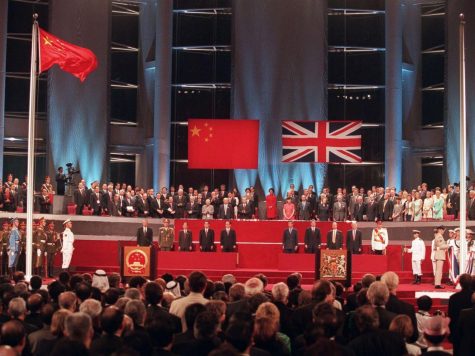
A scene from the Hong Kong handover ceremony.
China has always been the target of Empires far and near. From the Portuguese to the Japanese, many nations have sought the wealth and resources that lie within Chinese borders. In 1839, China, ruled by the Qing Dynasty, banned the sale and consumption of opium, believing it to be harmful to their people. This angered the British Empire, which had profited from the opium trade in China. The British Empire invaded Hong Kong and forced the Qing Dynasty to surrender Hong Kong to the British Empire in 1842, thus ending the Opium War. In 1898, the British Empire and China signed a 99-year lease allowing Britain to occupy Hong Kong until 1997.
On June 30, 1997, “God save the Queen” played as the British flag lowered and the Chinese Flag raised over Hong Kong. Hong Kong was established as a separate Autonomous Division of China, making it part of China, but having more autonomy, similar to the relationship between the United States and Puerto Rico.
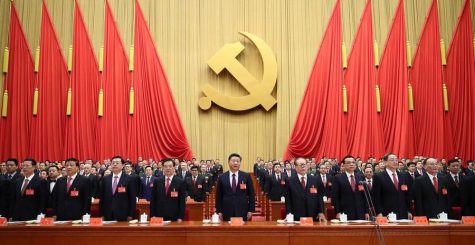
The Chairman of the Communist Party of China, Xi Jinping (center) with his comrades.
Since 1997, Hong Kong has become an economic powerhouse, which has caused jealousy from China. China is a communist authoritarian republic. Freedom of speech is not allowed. Freedom of religion is not allowed. All Chinese news organizations are owned wholly by the government. You may not criticize the government, you may not practice your faith, you may not read unbiased news. China is consistently ranked as one of the most oppressive regimes in the world. Despite being totalitarian, the Chinese economy is the second-largest in the world, behind the United States. The United States and China differ in their economic policies. In the United States, any citizen may open a business. In China, almost all businesses are owned and controlled by the government, and instead of the business and their investors earning profits, all money goes to the government, making China one of the last communist countries on earth.
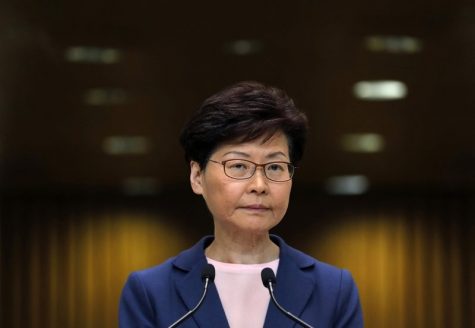
Chief Executive of Hong Kong: Carrie Lam
Hong Kong is a democracy. Freedom of speech is allowed, freedom of religion is allowed. Hundreds of news organizations are based out of Hong Kong and none are owned by the government. While most Chinese citizens cannot even use the internet without being monitored, citizens of Hong Kong do not fear the government. Until now.
On April 3, 2019, a bill was introduced to the Legislative Council of Hong Kong. This bill called the “Fugitive Offenders and Mutual Legal Assistance in Criminal Matters Legislation (Amendment) Bill 2019”, would allow criminals in Hong Kong to be extradited to mainland China. Laws that apply only to China, such as a ban on freedom of speech, religion and the press, would apply to citizens of Hong Kong. This would lead to most, if not all, citizens of Hong Kong being arrested.
This bill has been met with protests on an enormous scale. Since April, millions of citizens of Hong Kong have come out in force to demonstrate their contempt with the governments of Hong Kong and China. The chaos and confusion in the streets are unprecedented, police brutality is standard.
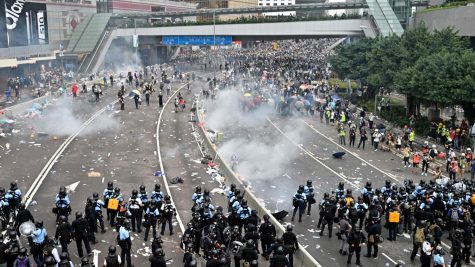
Protesters clash with riot police on the streets of Hong Kong. Smoke from tear gas could be seen rising from the streets all day.
On Sept. 4, the Chief Executive of Hong Kong, Carrie Lam, announced she would be withdrawing the bill in the hopes that the protests would stop. They have not. The protesters have announced five demands that must be met before they stop the protests. The first demand is to withdraw the extradition bill which has been met. The second demand is to investigate police brutality in Hong Kong. The third demand is to stop referring to the protesters as rioters. The fourth demand is to release the more than 700 protesters that have been arrested. Their fifth and final demand is to allow the citizens of Hong Kong to elect their own council. Currently, half of the Legislative Council of Hong Kong is appointed by the Chinese government, with the other half elected. Until these demands are met the protests will not stop.


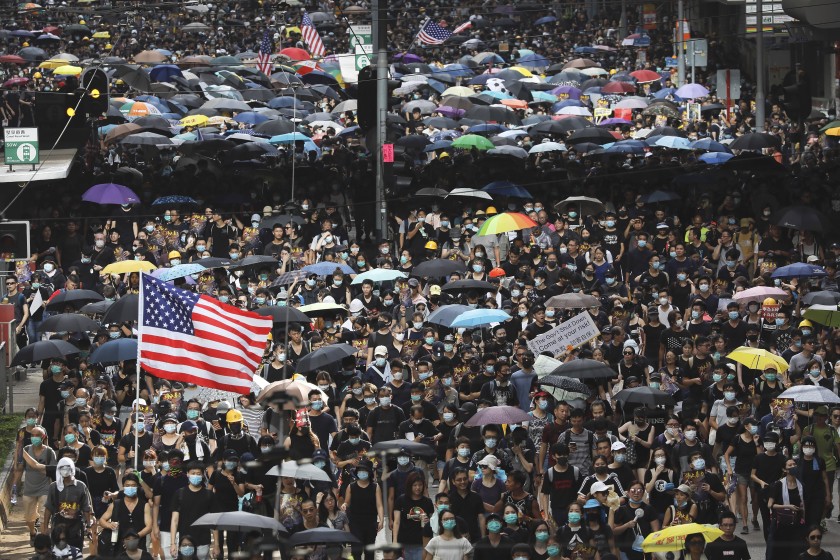
CJ Rivera ◊ Feb 13, 2020 at 9:31 am
nick cepek good article
Christian ◊ Jan 6, 2020 at 10:04 am
Amazing article covering something actually important.
Devin ◊ Oct 17, 2019 at 12:07 pm
Thank you, Nick Cepek, for writing this article. It’s truly informed me of the situation in Hong Kong.
Ethan Bohnert ◊ Oct 17, 2019 at 9:24 am
There is almost no point in history when China hasn’t been ruled by a dictator. I for one think it would be very interesting to see how the Chinese economy would change if the nation switched to American style Democracy. Would they be the most powerful nation on Earth? Sadly, no one knows, for the People’s Republic of China sadly won’t change any time soon.
Christian ◊ Oct 11, 2019 at 10:52 am
Nice actual news.
Eli Pregerson ◊ Oct 11, 2019 at 10:34 am
This is a very good article. Thank you for making it.
Ezra ◊ Oct 10, 2019 at 1:08 pm
This was very informative thanks Nick
Darius Rahmanian ◊ Oct 10, 2019 at 11:21 am
Mao Zedong killed upwards of 70 million Chinese citizens during his warpath to becoming the leader of Communist China, and the chairmen who followed have done no better. These protests against the Chinese strong arm have revealed the rotten claws the paper tiger has sunk into our nation and all of Asia.
John Tucci ◊ Oct 9, 2019 at 10:05 pm
I am so glad that the sage is doing news articles now.